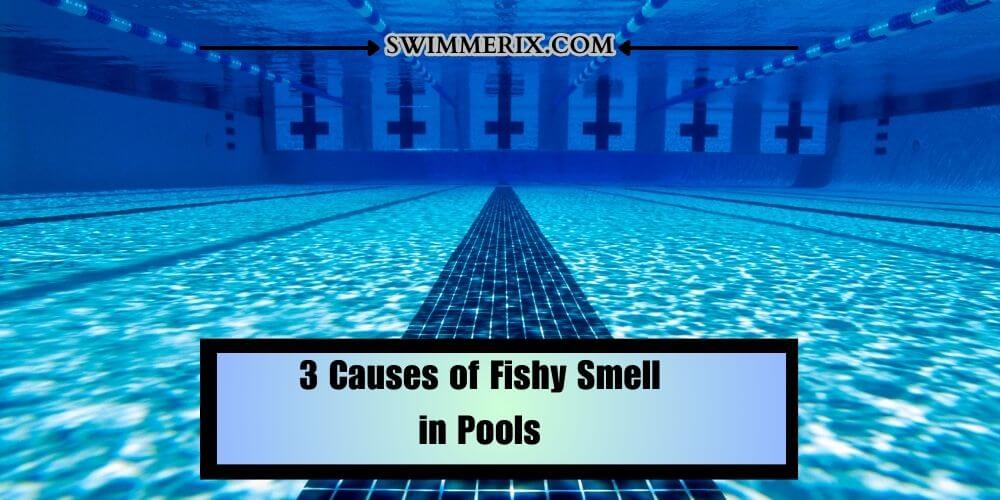
If you’re a proud pool owner, you’ll have to put effort into maintaining its water quality for a safe & fun swimming experience. Nothing can be more inviting and relaxing than a refreshing swim on a hot day. While owning a pool, you sometimes encounter fish smell coming out of its water.
If this is the case, then you are not alone. Many pool owners have already encountered this perplexing issue of a fish-like smell from their pool. In this article, I will help you learn ‘why my pool smells like fish’ and some solutions to help you back.
Why Does My Pool Smell Like Fish?

There can be many causes of pool water smelling like a fish, like inadequate filtration & circulation or the presence of organic compounds, contaminants & algae. The fish’s smell is often described as spicy & reminiscent of the sea, which may vary in intensity, sometimes barely noticeable, while at other times, it becomes over-powering.
Many people might dismiss this smell as a temporary inconvenience, but it is essential to recognize the real culprit behind this kind of pungent smell. It could indicate an underlying issue with your pool water quality.
Plus, the source often might lead to severe problems down the line. There are also many rumors & myths surrounding the fishy pool smell, which has circulated for years. One of the common misconceptions tends to be fish odor due to chlorine in the water, which is not true.
A study conducted by the National Institutes of Health reveals that a pungent smell is usually caused by the formation of chloramines which usually results from the reaction between chlorine and nitrogen-based substances introduced into the pool by swimmers.
When it comes to the potential health concerns due to the fouling smell, there are few. Undoubtedly the most pressing concern for pool owners with fish-smelling pools tends to be the odor posing any health risk to swimmers.
After all, no one will want to compromise their well-being just for a leisurely swim. After looking at several studies, including one carried out by the Centre for disease control & Prevention, I learned that certain exposure to chloramine tends to be the leading cause of fish smell which may also result in health issues.
This health issue can range from mild respiratory irritation, eye discount, and skin problems to more severe for individuals with existing respiratory conditions and asthma. It is worth noting that the risk of these adverse health effects will significantly increase with prolonged exposure to high chlorine levels.
Therefore, you must address this kind of fishy door coming out of your pool to ensure the safety & enjoyment of swimmers. Let’s discover the three major causes of fish smell in the pool and their solutions.
3 Causes of Fishy Smell in Pools

To tackle the fishy smell issue effectively, we must understand its root causes. Let’s explore the most common factors contributing to this unpleasant odor.
Presence of Algae
The most prevalent problem in the pool tends to be algae growth, especially if you don’t maintain your food properly daily. Algae are microscopic plant-like organisms that usually thrive in stagnant water, providing the perfect breeding ground for the fishy smell.
A study that the MDPI conducted found that certain types of algae, like cyanobacteria, are known to produce volatile compounds that may contribute to the fish-like odor in your pools. Also, you must pay attention to the proper algae prevention and treatment to keep your pool water smelling fresh. I will advise you to consider using Algaecides.
Organic Contaminants
Another possible reason your pool is smiling fishy could be organic content. The presence of organic contaminants like sweat, body oils, urine, and cosmetics are often introduced into pool water by swimmers & their owners.
Hence, when chlorine in the pool reacts with these kinds of organic contaminants/substances, it forms chloramine, producing a fishy smell. A study published in the Journal of Wiley Online Library found that the chloramine concentration in pool water correlates with the number of swimmers & their hygiene habits.
Therefore, ensure that you educate the swimmers about showering before entering the pool and afterward to reduce the introduction of organic contaminants in your pool that may contribute to the stronger fish odor.
Inadequate Filtration & Circulation
Another reason your pool might be smelling fishy could be due to inadequate pool filtration & circulation systems. Proper pool circulation & filtration systems play a crucial role in maintaining water clarity and quality.
If any of these systems are not functioning properly, they will fail to remove contaminants effectively, which further contributes to the accumulation of chloramines in the pool, resulting in fish.
Therefore, you must adhere to regular maintenance and pay attention to occasionally cleaning the pool filters & circulation equipment to prevent foul odors and ensure a healthy pool environment for yourself & your loved ones.
Preventive Measures
Now that we understand the factors causing the fishy pool smell let’s explore preventive measures to keep your pool water fresh and inviting.
Regular Pool Maintenance
As the saying goes, Prevention is always better than cure, and the same holds for pool maintenance. Therefore, you must adopt a proactive approach to pool care, significantly reducing the risk of encountering a fishy-smelling pool.
I will advise you to pay attention to regular pool maintenance tasks like skimming debris, vacuuming, and brushing the pool walls to help minimize the accumulation of organic matter contaminants and algae.
Proper Water Chemistry
Also, you must pay attention to testing the pool water from time to time to determine and adjust any chemical imbalances. You must maintain proper water chemistry balance for optimal pool health.
Being a responsible pool owner, you should never hesitate to test the pool water and adjust the chemical level to ensure they fall within the recommended range.
According to World Health Organization research, you should maintain an ideal pH range between 7.2 and 7.8. In contrast, chlorine should be maintained at 1-3 PPM to prevent chloramine formation.
Algae Prevention & Treatment
Another area you must pay attention to is algae growth in pool water. If you want to keep the algae growing, I will advise using algaecides and algae stats, chemicals designed to inhibit algae development.
These products are easily available in online stores and can be found in various forms, including liquid, granular, & tablet forms, making them easy to apply. However, avoid Too Much Algaecide in Pool. The California Pool Association reveals that regular use of algaecides is very helpful in reducing the risk of algae-related pool odors and maintaining the water quality at its best.
Remedies for Fishy Smell
If your pool has already succumbed to the fishy smell, don’t fret. There are effective remedies that can help restore the fresh pool water scent.
Shock Treatment
The best thing you can consider is giving a shock treatment to your pool which involves super chlorination of cool water to break down chloramines and eliminate contaminants. This process is very helpful in restoring water clarity while neutralizing any odor.
Shock treatment effectively reduces chloramine levels and improves water quality for a safe & fun swimming experience. Therefore, consider shock treatment once or twice to eliminate the fishy smell from your pool.
| Topics Related To Shock Treatment |
| White Stuff on the Bottom of the Pool After Shocking |
| Can I Shock Pool After Adding Baking Soda |
| Should You Filter or Recirculate Pool When Shocking |
Activated Carbon Filters
Another thing that you can do to eliminate the fishy odors from your pool is to incorporate activated carbon filters. Activated carbon filters in your pool circulation system can also help remove impurities, including chloramines, responsible for smelly pool water.
These filters usually work by absorbing contaminants on the carbon surface. A study by the water quality association reveals that activated carbon filters improve water quality clarity and reduce odors in swimming pools.
Conclusion
If you have wondered, ‘Why does my pool smell like fish,’ then you are not alone. After reading this article, I hope you got to know all the practical solutions that can help you aid this issue.
I will highly advise you first to understand the root cause to adopt appropriate solutions & preventive measures. Also, make sure to implement the remedies effectively. You must follow all the precautions and instructions the manufacturer or professional directs.
I have given my best to give you all the information on the question: why does my pool smell like fish, and what can you do about it to keep your pool a source of joy & relaxation for all swimmers, especially during hot weather?
Ensure you prioritize regular pool maintenance, proper water quality, and adequate filtration to keep your pool water pristine and free from foul odors.
If you follow all the guidelines mentioned in the article and incorporate the tips, you will confidently create a fishy-smell-free oasis in your backyard.
If you find this article helpful, where we have discussed three reasons why my pool smells like fish, consider sharing it. Your share is going to help people learn the causes of why my pool smells like fish but also what they can do about it. Check my other helpful guide on pool care & maintenance shared on this website. See you in the next post, till then, take care & goodbye.

